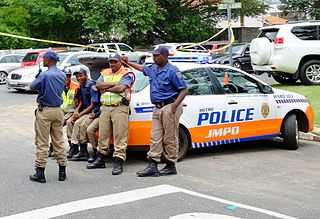| Criminal Procedure Act, 1977 |
|---|
 |
| Act to make provision for procedures and related matters in criminal proceedings. |
| Citation | Act No. 51 of 1977 |
|---|
| Enacted by | Parliament of South Africa |
|---|
| Date assented to | 21 April 1977 |
|---|
| Date commenced | 22 July 1977 |
|---|
| Status: In force |
The Criminal Procedure Act, 1977 (Act No. 51 of 1977) is an act of the Parliament of South Africa that governs criminal procedure in South Africa's legal system. It details the procedure for the whole system of criminal law, including search and seizure, arrest, the filing of charges, bail, the plea, the testimony of witnesses and the law of evidence, the verdict and sentence, and appeal.
An act of parliament, also called primary legislation, are statutes passed by a parliament (legislature). Act of the Oireachtas is an equivalent term used in the Republic of Ireland where the legislature is commonly known by its Irish name, Oireachtas. It is also comparable to an Act of Congress in the United States.

The Parliament of South Africa is South Africa's legislature and under the country's current Constitution is composed of the National Assembly and the National Council of Provinces.
Criminal procedure in South Africa refers to the adjudication process of that country's criminal law. It forms part of procedural or adjectival law, and describes the means by which its substantive counterpart, South African criminal law, is applied. It has its basis mainly in English law.
The act is also in force in Namibia, which inherited it from the South African administration of South-West Africa. Administration of the act was transferred to the SWA government in 1979, and since then the South African and Namibian versions have diverged through amendment. A new Namibian Criminal Procedure Act was passed in 2004 but has not yet come into force.

Namibia, officially the Republic of Namibia, is a country in southern Africa. Its western border is the Atlantic Ocean; it shares land borders with Zambia and Angola to the north, Botswana to the east and South Africa to the south and east. Although it does not border Zimbabwe, less than 200 metres of the Zambezi River separates the two countries. Namibia gained independence from South Africa on 21 March 1990, following the Namibian War of Independence. Its capital and largest city is Windhoek, and it is a member state of the United Nations (UN), the Southern African Development Community (SADC), the African Union (AU), and the Commonwealth of Nations.

South West Africa was the name for modern-day Namibia when it was under South African administration, from 1915 to 1990.

The High Court of Justiciary is the supreme criminal court in Scotland. The High Court is both a trial court and a court of appeal. As a trial court, the High Court sits on circuit at Parliament House or the former Sheriff Court building in Edinburgh, or in dedicated buildings in Glasgow and Aberdeen. The High Court sometimes sits in various smaller towns in Scotland, where it uses the local sheriff court building. As an appeal court the High Court sits only in Edinburgh.
The Constitution of South Africa is the supreme law of the Republic of South Africa. It provides the legal foundation for the existence of the republic, sets out the rights and duties of its citizens, and defines the structure of the government. The current constitution, the country's fifth, was drawn up by the Parliament elected in 1994 in the South African general election, 1994. It was promulgated by President Nelson Mandela on 18 December 1996 and came into effect on 4 February 1997, replacing the Interim Constitution of 1993.

The Criminal Code is a law that codifies most criminal offences and procedures in Canada. Its official long title is "An Act respecting the criminal law". Section 91(27) of the Constitution Act, 1867 establishes the sole jurisdiction of Parliament over criminal law in Canada.

The courts of Scotland are responsible for administration of justice in Scotland, under statutory, common law and equitable provisions within Scots law. The courts are presided over by the judiciary of Scotland, who are the various judicial office holders responsible for issuing judgments, ensuring fair trials, and deciding on sentencing. The Court of Session is the supreme civil court of Scotland, subject to appeals to the Supreme Court of the United Kingdom, and the High Court of Justiciary is the supreme criminal court, which is only subject to the authority of the Supreme Court of the United Kingdom on devolution issues and human rights compatibility issues.
Group Areas Act was the title of three acts of the Parliament of South Africa enacted under the apartheid government of South Africa. The acts assigned racial groups to different residential and business sections in urban areas in a system of urban apartheid. An effect of the law was to exclude non-Whites from living in areas which were restricted to Whites. It caused many non-Whites to have to commute large distances from their homes in order to be able to work. The law led to non-Whites being forcibly removed for living in the "wrong" areas. The non-white majority were given much smaller areas to live in than the white minority who owned most of the country. Pass Laws required that non-Whites carry pass books, and later 'reference books' to enter the 'white' parts of the country.

South Africa has a 'hybrid' or 'mixed' legal system, formed by the interweaving of a number of distinct legal traditions: a civil law system inherited from the Dutch, a common law system inherited from the British, and a customary law system inherited from indigenous Africans. These traditions have had a complex interrelationship, with the English influence most apparent in procedural aspects of the legal system and methods of adjudication, and the Roman-Dutch influence most visible in its substantive private law. As a general rule, South Africa follows English law in both criminal and civil procedure, company law, constitutional law and the law of evidence; while Roman-Dutch common law is followed in the South African contract law, law of delict (tort), law of persons, law of things, family law, etc. With the commencement in 1994 of the interim Constitution, and in 1997 its replacement, the final Constitution, another strand has been added to this weave.

The Criminal Law Act 1977 (c.45) is an Act of the Parliament of the United Kingdom. Most of it only applies to England and Wales. It creates the offence of conspiracy in English law. It also created offences concerned with criminal trespass in premises, made changes to sentencing, and created an offence of falsely reporting the existence of a bomb.

Law enforcement in South Africa is primarily the responsibility of the South African Police Service (SAPS), South Africa's national police force. SAPS is responsible for investigating crime and security throughout the country. The "national police force is crucial for the safety of South Africa's citizens" and was established in accordance with the provisions of Section 205 of the Constitution of South Africa.
Prostitution in South Africa is illegal for both buying and selling sex, as well as related activities such as brothel keeping and pimping. However, it remains widespread. Law enforcement is poor.

An Act of Sederunt is secondary legislation made by the Court of Session, the supreme civil court of Scotland, to regulate the proceedings of Scottish courts and tribunals hearing civil matters. Originally made under an Act of the Parliament of Scotland of 1532, the modern power to make Acts of Sederunt is largely derived from the Courts Reform (Scotland) Act 2014. Since 2013, draft Acts have also been prepared by the Scottish Civil Justice Council and submitted to the Court of Session for approval.

The Criminal Law Amendment Act, 1997 is an act of the Parliament of South Africa which dealt with the consequences of the Constitutional Court's ruling in S v Makwanyane in which capital punishment was declared to be unconstitutional. The act repealed the laws allowing for the death penalty and amended various other laws referring to death sentences or capital offences. It also established a procedure by which existing death sentences could be converted to prison sentences, and fixed minimum sentences for certain serious crimes. The act came into force on 13 November 1998, except for the minimum sentencing provisions, which came into force on 1 May 1998.

The Recognition of the Independence of Namibia Act, 1990 is an act of the Parliament of South Africa by which the South African government recognised the independence of Namibia, which had been under disputed South African administration as South West Africa. The act received the assent of State President F. W. de Klerk on 20 March 1990 and came into force on the following day, the date of Namibian independence. It does not grant independence to Namibia, but rather recognises the Republic of Namibia as "a sovereign and independent state".
S v Acheson is an important case in Namibian and South African law, especially in the area of criminal procedure. It was heard in the Namibia High Court from 18 to 20 April 1990, by Mahomed AJ, who handed down judgment on 23 April 1990. T. Grobbelaar SC appeared for the accused, and H. Heyman for the State.

An Act of Adjournal is secondary legislation made by the High Court of Justiciary, the supreme criminal court of Scotland, to regulate the proceedings of Scottish courts hearing criminal matters. Now primarily derived from the Criminal Procedure (Scotland) Act 1995, the original power to create Acts of Adjournal is derived from an Act of the Parliament of Scotland of 1672. Before promulgation, Acts of Adjournal are reviewed and may be commented upon by the Criminal Courts Rules Council.

The judiciary of Namibia consists of a three-tiered set of courts, the Lower, High and Supreme Courts. Parallel to this structure there are traditional courts dealing with minor matters and applying customary law.
The administration of justice is the process by which the legal system of a government is executed. The presumed goal of such administration is to provide justice for all those accessing the legal system. The phrase is also used commonly to describe a University degree, which can be a prerequisite for a job in law enforcement or government.

The Code of Civil Procedure, 1908 is a procedural law related to the administration of civil proceedings in India.
Namibia has a 'hybrid' or 'mixed' legal system, formed by the interweaving of a number of distinct legal traditions: a civil law system inherited from the Dutch, a common law system inherited from the British, and a customary law system inherited from indigenous Africans. These traditions have had a complex interrelationship, with the English influence most apparent in procedural aspects of the legal system and methods of adjudication, and the Roman-Dutch influence most visible in its substantive private law. As a general rule, Namibia follows English law in both criminal and civil procedure, company law, constitutional law and the law of evidence; while Roman-Dutch common law is followed in the Namibian contract law, law of delict (tort), law of persons, law of things, family law, etc. With the commencement in 1994 of the interim Constitution, and in 1997 its replacement, the final Constitution, another strand has been added to this weave.











